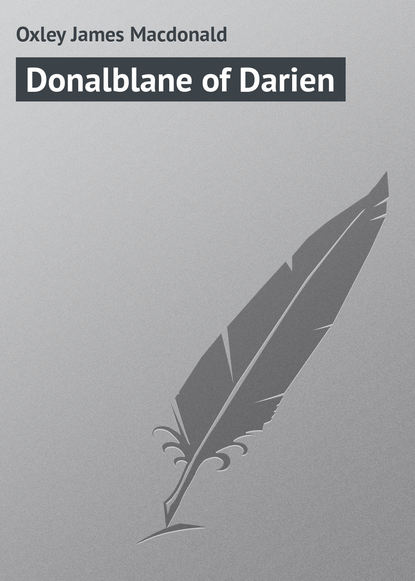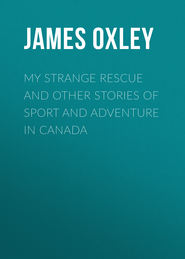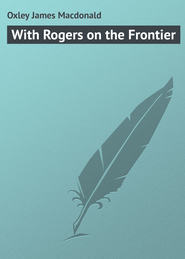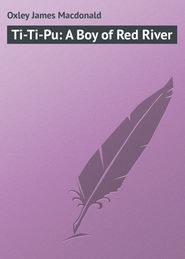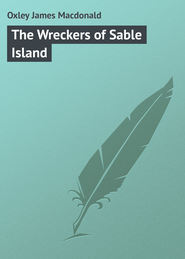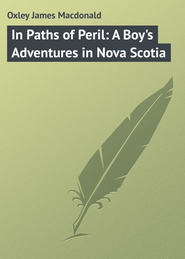По всем вопросам обращайтесь на: info@litportal.ru
(©) 2003-2024.
✖
Donalblane of Darien
Настройки чтения
Размер шрифта
Высота строк
Поля
It was really very trying to Donald to be the subject of such demonstration, and he was quite glad to get away from the grateful parents and the applauding crowd to his own cabin to put on some dry clothes. But when the first excitement subsided and he found that he had not only won the respect of his shipmates, but also the warm friendship of the Sutherlands, who were very fine people, he felt that the game was well worth the candle, and that he was splendidly repaid for the risk he had taken.
The first part of the long voyage across the great Atlantic Ocean was devoid of special incident. The ships presently scattered, so that each was alone in the vast expanse; and the days followed one another monotonously enough until the Bonnie Scotland sighted the Azores Islands, and, to the delight of all on board, it was announced that a call at Fayal would be made in order to replenish the supply of water.
By this time Donalblane had got a pretty good understanding of all his fellow-voyagers. His likes and dislikes were clearly defined, and, young as he was, his natural shrewdness told him that there were only too many in the company it would have been far better to have left at home.
The Sutherlands were his special friends. He had won their hearts completely, and he took great delight in the company of their little son Walter, who loved him as though he fully understood that he owed him his life.
At Fayal the four of them went ashore together, and Donalblane thought he had never before realised how pleasant it was to be on the solid ground as after these weeks of tossing about in an overcrowded ship.
"Eh, but this is bonnie!" he exclaimed enthusiastically, as his big eyes roamed over the novel and picturesque landscape. "I'd like well if this were Darien, and we need gang no farther."
Mr. Sutherland smiled at the boy's frankness. "You've evidently had enough of the Bonnie Scotland, Donald," he said. "So, too, have I. I'd be right glad to be rid both of the ship and many of her company. But we're not half-way to Darien yet."
The striking combination of rugged grandeur with tropical beauty which the Azores presented delighted Donald, and during their stay he spent the whole day ashore exploring the islands, usually in company with Mr. Sutherland. They revelled in the oranges and other fruit that were to be had almost for the asking, and Donald used to amuse Mr. Sutherland exceedingly by his lively effort to make himself understood by the inhabitants, who were chiefly Portuguese.
One adventure befell him that might have had a serious result. He had gone off wandering on his own account, and lost his way amidst the ravines which pierce the mountains in every direction, and lead one into another in a puzzling fashion. The harder he strove to extricate himself from the maze, the deeper he got into it, until at last, a little before sundown, he found himself in a regular cul-de-sac, from which there appeared to be no exit save by climbing the precipitous cliffs which shut him in, and it would soon be too dark to attempt that. "Losh me!" he sighed ruefully, "but I'm fair trapped, and what shall I do for the nicht?"
The question was more easily asked than answered. Of course to a son of the Highlands the spending of a night in the open was not a serious matter, so far as exposure was concerned; but how about danger from wild animals? This was what concerned Donalblane, and he was glad that he had put a pistol in his belt before leaving the ship. Wearied and perplexed, he had thrown himself down on the sward, when there suddenly hove in sight a big boar leading a small band of sows and piglings. He was a tusker of most forbidding appearance, and the instant his wicked little eyes fell upon Donalblane he bristled up and began gnashing his tusks ominously.
The boy sprang to his feet and drew his pistol, while he looked anxiously about him for a way of escape. "Save us a'!" he cried. "What a fearsome brute! He means ill to me, I'm thinking."
There seemed nothing for it but to stand firm and trust to his pistol. So, after a swift glance to make sure that the priming was in its place, he braced himself for the attack.
The boar did not waste much time. Having satisfied himself that this intruder upon his domain deserved no mercy, he charged fiercely at him, the foam flying from his gleaming tusks, and the thick bristles standing out on his mighty front.
Donalblane wisely waited until the fierce creature was within a few yards of him, and then fired, taking aim at the very centre of the forehead. At the report of the pistol the boar pitched forward, driving his snout into the ground, so great was his impetus, and Donalblane, thinking him dead, shouted triumphantly, "Noo, ye fool! will ye be trying to scare folk who meant ye no harm?" But his words had hardly left his lips when the boar, which had been only stunned, his tough, wrinkled hide proving an effectual shield, got upon his feet again and renewed the charge so furiously that Donalblane barely saved himself by a sudden spring aside. Baffled for the moment, the maddened brute swiftly swung round for a fresh onset, and Donalblane was fain to flee towards the cliffs, followed by the boar and his whole family, grunting and squealing.
There was no boy in Leith could out-foot him, and he dashed away at such a speed as gave him a good lead. But where was he to go, in order to escape the relentless monster that sought to rend him? And if it came to a question of endurance, the boar would assuredly run him down in the end.
CHAPTER V
ACROSS THE ATLANTIC
Running as one runs whose life is at stake, Donalblane looked hither and thither for some break in the cliffs that would give him a chance to climb out of his fell pursuers' reach. At last, with a thrill of joy, his eye perceived one, and, summoning all his energies for a supreme effort, he darted thither.
The ravening swine were gaining upon him at a rate which meant his soon being overtaken, and if he should stumble his fate was certain.
But the sure-footed faculty of the Highlander stood him in good stead. He neither slipped nor tripped, and kept steadily on, until well-nigh spent he won his race for life by so scanty a margin that the baffled boar drove hard against the friendly rock up which his intended victim had sprung to safety.
It was little more than a ledge which afforded Donalblane such timely sanctuary, and it did not lead far; but, about twenty feet from the ground, he found a sort of niche wherein he could dispose his exhausted body with some degree of comfort.
"Eh, man, but I'm well-nigh dead!" he panted, as he stretched out on the moss-covered rock. "Anither ten yards and he'd have had his tusks into me. Ah, weel, he'll no' get anither chance, though I stay here a' nicht!"
As the boar was grunting and gnashing, and his squealing family were evidently determined to invest the place, Donalblane proceeded to settle down as comfortably as he could.
Happily the moss lay thick on the rock, and really made quite a soft couch. It was a fine, warm night, and if he had only had food and drink he would not have greatly minded. But the pangs of hunger, and especially of thirst, took possession of him, and he had a wretched time of it as the long hours dragged slowly by. Some time during the night the pigs disappeared, and when day dawned the coast was clear.
Feeling very stiff and sore and out of sorts, Donalblane clambered down into the valley, and set off to find his ship. By a lucky chance, after a couple of hours' vain wandering, he came upon a couple of natives laden with oranges evidently intended for market.
They, of course, could not understand his words, but by vigorous pantomime he got into their heads the two facts, that he wanted some of their oranges, and to be shown the way to the harbour.
For a bit of silver they filled his hands with the fruit, which the starving boy found very refreshing if not quite satisfying; and then, by keeping them company, he came in due time to where the welcome sight of the Bonnie Scotland gladdened his eyes. On his return to the ship he found his friends in great concern about him, and Mr. Sutherland actually organising a party to go in search of him.
They were considerably amused at his story, and thereafter he had to endure many a joke in regard to his supposed fondness for pork.
Leaving the lovely islands with good stores of fruit, fresh provisions, and water, the Bonnie Scotland pursued her way westward through storm and {50} calm until the drawing near of the New World was announced by tropical things that came out to meet her on the bosom of the deep.
Thenceforward every eye scanned eagerly the horizon, and Donalblane spent most of his time high up the mainmast, it being his ambition to be the first among the passengers to sight the land. Mr. Paterson, whose kindly interest in the boy had increased during the voyage, promised him a golden guinea if he did sight land first, and this of course intensified his desire.
His patience was sorely tried, for when the ship reached the dreaded Sargasso Sea her onward progress was checked for many a weary day by the provoking seaweed which held her fast.
"I'm afraid you'll not soon win your guinea, Donald," said Mr. Sutherland, after they had been apparently motionless for several days. "We're bound to stay where we are until a strong wind is good enough to spring up and help us out."
But the wind seemed in no hurry to come, and the gulf-weed kept them prisoners until at last something in the nature of a hurricane struck the Bonnie Scotland, and she scudded helplessly before it under bare poles for a whole day, her passengers' impatience to sight land being for the time replaced by a lively fear of foundering.
In spite of being so poor a craft, however, the Bonnie Scotland braved out the peril, and the following morning Donalblane, who had taken to the mast as soon as he had swallowed his breakfast, made the hearts of all on deck thrill with joy by the cry of —
"The land! the land! I can see it! Look! Look!"
An instant later the look-out at the bow confirmed him by shouting —
"Land ho! on the weather bow!" and the ship-wearied folk forgot for the moment their mutual animosities which had abounded during the long voyage, and rejoiced together that the end of their trials was at hand.
"Here's your guinea, my lad," said Mr. Paterson, as he handed Donalblane a bright new coin. "You've earned it well, and I hope that good fortune may always befall you."
As Donalblane thanked his kind friend he vowed to himself that that beautiful gold piece should not be hastily spent, but that he would keep it as long as possible in memory of the giver, and the reason for the gift.
It was one of the West India Islands they were approaching, and as they passed within half-a-league its wealth of tropical vegetation presented so pleasing a picture that the passengers besought the captain to make a landing in one of the tempting coves, so that they might have a run on shore, and probably get some fruit. But he was a surly fellow, and refused the request with an oath, saying that he was sick of the whole lot of them, and wanted to be rid of them with as little delay as possible.
So the Bonnie Scotland kept on her course, leaving the lovely islands astern, and out of sight as she passed into the wide expanse of the Caribbean Sea.
Coarse and brutal as he was, her captain understood navigation, and knew how to get the best out of the old hulk of which he had command. Now, as the end of the voyage drew near, and the seas seemed kind, he cracked on all the sail the ship would carry, greatly to the delight of Donalblane, who loved to have the vessel plunging along at full speed.
More than half the breadth of the sea had been traversed when the look-out one morning shouted —
"Sail ho! Sail ho!"
"Where away?" roared the captain from the poop.
"Right abeam, and coming towards us," was the response after a moment's hesitation.
At once there was much excitement on board. The members of the expedition took it for granted that this was one of the other ships from which they had long parted company, and began to speculate which one it was, and whether it would overtake them.
"I was hoping ours would be the first vessel to reach Darien," said Mr. Sutherland to Donalblane. "It would be something to boast of considering what a poor thing she is. I wonder which one of the others this is?"
"Ye canna tell so far away," responded Donalblane. "Maybe it winna catch us. We're sailing fine now."
The Bonnie Scotland certainly was doing wonders, but in spite of every inch of canvas her sticks could carry being spread, the other ship gained steadily, and the captain's grim countenance grew darker and darker.





